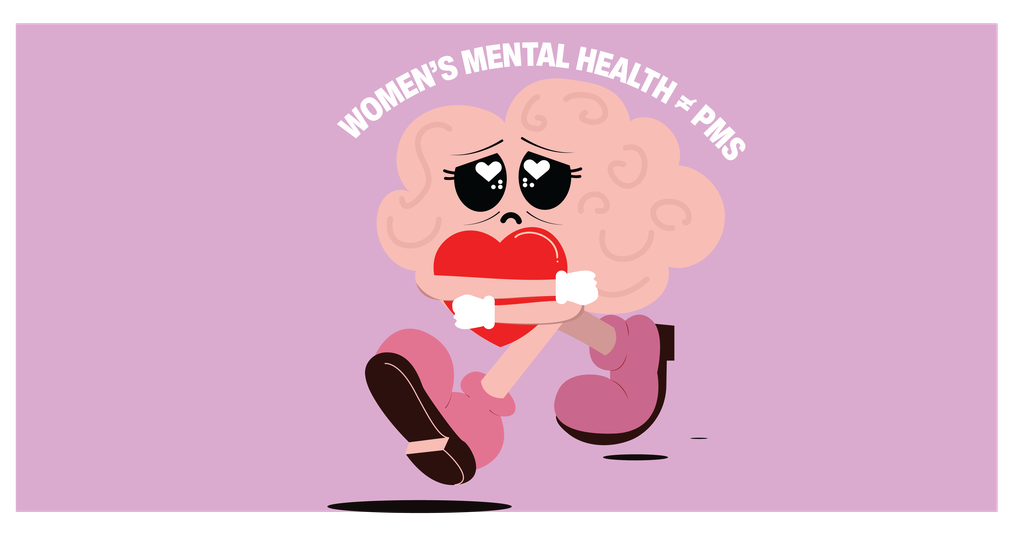We need to recognize and invest in women’s mental health now
Women’s mental health is a widely unknown, under-researched and under-funded area of study, even though women are prone to more mental health issues than men.
According to the Anxiety & Depression Association of America, women are twice as likely to be diagnosed with generalized anxiety disorder, panic disorder, and specific phobias, when compared to men. The organization also states that women are three times more likely to be affected by obsessive compulsive disorder, and five times more likely to be affected by post-traumatic stress disorder. Although these differences in gendered symptoms of mental health have been investigated, researchers often fail to consider specific symptoms unique to women and femme-identifying individuals.
Issues related to menstruation, like premenstrual syndrome (PMS) and premenstrual exacerbation (PME), are severely under-investigated because their legitimacy remains in question. PME, a trait of PMS, is a phenomenon in which menstruation heightens pre-existing health issues, such as schizophrenia, and eating disorders. Dr. Adwoa Danso-Boamah, a general practitioner at the National Health Service, emphasizes this observation by saying, “[PME] is not the same as having pre-menstrual syndrome, as [those with PME] have symptoms throughout their cycle, but, characteristically, have worsening symptoms of an existing medical condition such as anxiety, depression, or migraine.” However, this does not mean women’s mental health issues are only related to menstruation.
Apart from PME, many other mental health issues manifest differently between sexes. For example, women on the autism spectrum exhibit different symptoms than men on the autism spectrum. The habit of masking is more common in autistic women than in men. According to a post by Elemy, a platform for childhood behavioural and mental healthcare, “Autism masking involves spotting those symptoms yourself and working desperately to hide them. It’s common in people who don’t have an autism diagnosis, and sometimes, masking keeps people from getting the help they need.” The under-diagnosis and misrecognition of autism in women plays a significant role in the need for women with autism to mask. Previous research on autism has been conducted predominantly on male subjects. As such, symptoms and diagnoses used to define autism have become characteristic to males. Masking in women can often be observed when: women stay close to their peers, mimic others’ social behaviours, including facial expressions, and suppress behaviours that tend to be frowned upon.
Another example of women masking their mental health-related symptoms is with attention deficit hyperactivity disorder (ADHD). Women learn to hide their natural behaviours more efficiently than men. In young girls, when ADHD is usually diagnosed, there is an exhibited tendency to internalize the disorder, often causing the development of anxiety, which is not as great of a disturbance in class, resulting in teachers and parents being unaware of the symptoms in girls. This lack of diagnoses is carried into adulthood where women internalize their symptoms leading them to fall into depression, cause distress, or, find it difficult to manage their emotions.
Gender-based discrimination isn’t only a factor in the diagnoses of neurodivergent disorders; it is also the culprit of many women’s issues. Sexist remarks and harassment, like catcalling and workplace discrimination are forms of sexism that women experience daily. According to an article in the British Journal of Psychiatry, the more women experience gender discrimination, the more likely they are to have symptoms related to depression, anxiety, and post-traumatic stress disorder. Another indirect impact of sexism is the underrepresentation of women in medical research. A study published in the journal Biology of Sex Differences states, “Women experience adverse drug reactions […] nearly twice as often as men,” largely because clinical drug trials are conducted with disproportionate focus on male participants.
There is still a threatening discrepancy in mental health research on women. The issues faced by women and femme-identifying individuals deserve the attention of scientists just as much as anything else. Women should not be forced to live with their issues, while being expected to carry on with their responsibilities. While science lags in female mental health research, women in the real world continue to feel their pain every day. When will it end?

